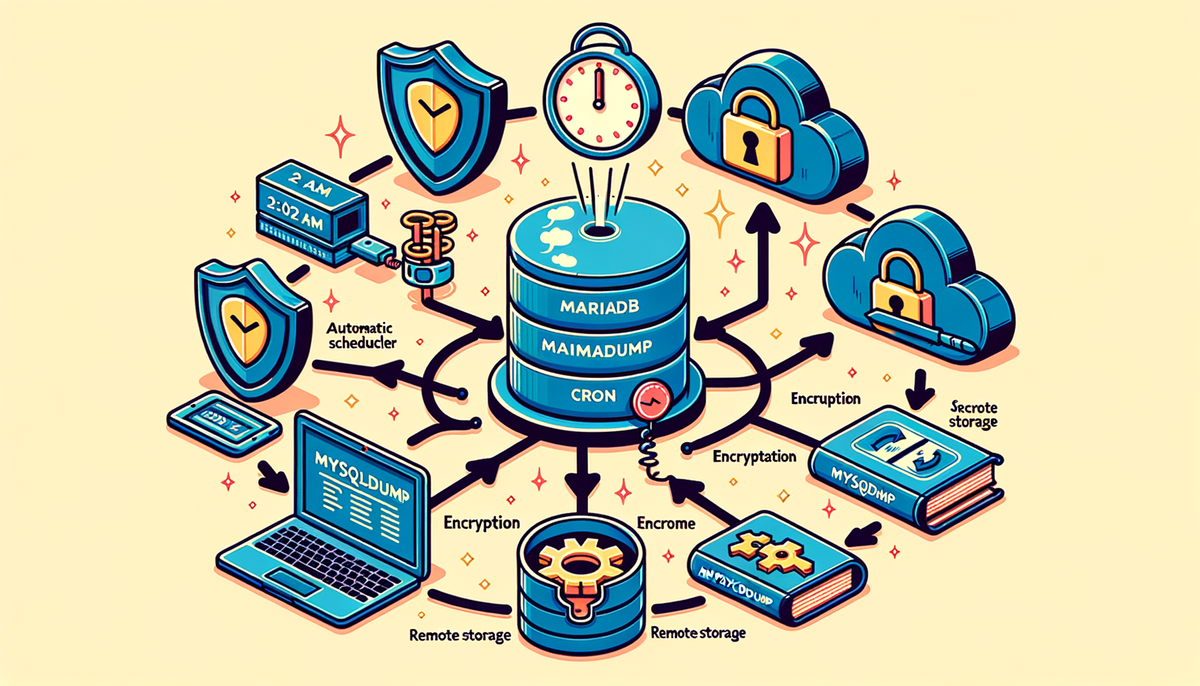Scheduling Automatic MariaDB Dumps: Best Practices and Tools
Secure your MariaDB data with automated backups! This guide shows you how to use cron, mysqldump, and best practices to schedule reliable backups, encrypt them, and store them remotely. Learn how to set up automated scripts and protect your database from data loss.

Let's talk about backing up your MariaDB database. It's like having a copy of your favorite toy, just in case the first one gets lost or broken. You don't want to lose all your important information, right? In this guide, we'll learn how to make copies of our MariaDB databases automatically using some cool tools and helpful tips.
Why Schedule Automatic MariaDB Dumps?
Imagine your computer breaks, and all the pictures and games you saved are gone! It's sad, isn't it? That's why we make copies, or "backups," of our data. By making backups automatically, we can recover our data if something bad happens. It's like having a safety net for our important information.
Tools for Scheduling MariaDB Dumps
There are special tools that help us automate the backup process:
- cron: Think of it like a reminder that tells your computer to do something at a specific time. We'll use this to tell our computer to make a backup every day.
- mysqldump: This is a tool that makes a copy of our MariaDB database. It's like taking a picture of everything in the database.
- Automated scripts: These are like instructions that combine
cronandmysqldumpto make our backup process super easy.
How to Use cron for Scheduling
Let's use cron to tell our computer to make a backup every day at 2 AM. Here's how:
Step 1: Open the crontab File
Open your computer's terminal (a window where you type commands). Type this command:
crontab -e
Step 2: Add a New cron Job
Now, we'll tell cron to make a backup. Add this line:
0 2 * * * /usr/bin/mysqldump -u [username] -p[password] [database_name] > /path/to/backup/backup_$(date +%F).sql
This line tells cron to run the mysqldump command every day at 2 AM. Don't forget to replace:
[username]: Your username for the MariaDB database.[password]: Your password for the MariaDB database.[database_name]: The name of your database./path/to/backup/: Where you want to save the backup.
Step 3: Save and Exit
After typing this line, save the changes and close the file. Now, your computer will automatically make a backup every day at 2 AM!
Best Practices for Scheduling MariaDB Dumps
Use Encrypted Backups
Imagine someone finding your backup and seeing all your data! To protect your data, we can lock the backup with a special key. This is called "encryption." Here's how:
mysqldump -u [username] -p[password] [database_name] | gzip | gpg -c -o /path/to/backup/backup_$(date +%F).sql.gpg
This line will make a backup, compress it, and then encrypt it. You'll need to know the password to open the locked backup.
Use Remote Storage
What if your computer breaks, and the backup is also on that computer? We need to keep the backup in a safe place! A good idea is to store the backup on another computer or in the cloud. Here's how to copy the backup to another computer using scp:
scp /path/to/backup/backup_$(date +%F).sql user@remote_host:/remote/backup/path/
Rotate Old Backups
Making backups every day can take up lots of space. To save space, we can remove older backups. Here's how to remove backups older than 30 days:
find /path/to/backup/ -type f -name "*.sql" -mtime +30 -exec rm {} \;
Add Error Logging
It's helpful to know if the backup process has any problems. We can create a special file to log any errors that occur during the backup process:
0 2 * * * /usr/bin/mysqldump -u [username] -p[password] [database_name] > /path/to/backup/backup_$(date +%F).sql 2>> /path/to/logs/backup_errors.log
Example Script for Automated Backups
Let's combine all these best practices into one script for automatic backups:
#!/bin/bash
# Variables
USERNAME="your_username"
PASSWORD="your_password"
DATABASE="your_database"
BACKUP_DIR="/path/to/backup/"
LOG_FILE="/path/to/logs/backup_errors.log"
# Create backup
BACKUP_FILE="${BACKUP_DIR}backup_$(date +%F).sql"
mysqldump -u $USERNAME -p$PASSWORD $DATABASE > $BACKUP_FILE 2>> $LOG_FILE
# Encrypt backup
gpg -c -o ${BACKUP_FILE}.gpg $BACKUP_FILE && rm $BACKUP_FILE
# Copy to remote server
scp ${BACKUP_FILE}.gpg user@remote_host:/remote/backup/path/ 2>> $LOG_FILE
# Rotate old backups
find $BACKUP_DIR -type f -name "*.sql.gpg" -mtime +30 -exec rm {} \;
# End of script
Save this script as auto_backup.sh, and make it executable:
chmod +x /path/to/auto_backup.sh
Now, we need to tell cron to run this script:
0 2 * * * /path/to/auto_backup.sh
Conclusion
By following these steps, you can make sure your MariaDB databases are backed up automatically and securely. Remember, it's like having a special friend who always keeps a copy of your favorite things, just in case something happens! So, make backups today and sleep soundly knowing your data is safe.




